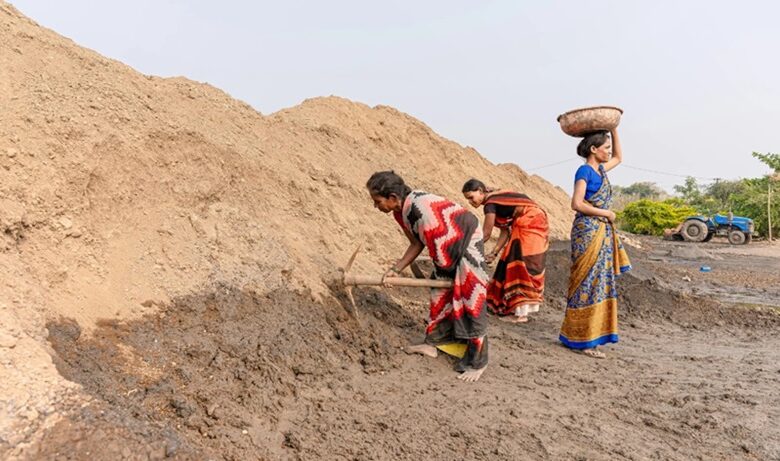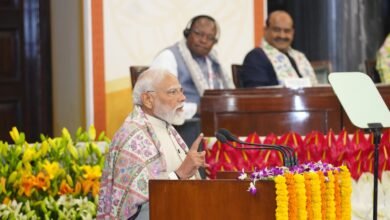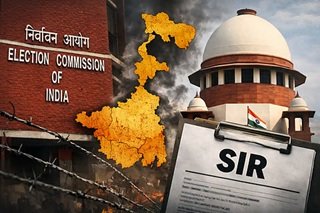Do India’s labour codes address informal workers’ needs?
News Mania Desk / Piyal Chatterjee / 31th March 2025

The Government of India has passed four labor codes in recent years that are set to be implemented. These codes represent a significant milestone in managing labor in modern India. These encompass the Code on Wages, 2019; the Occupational Safety, Health and Working Conditions Code, 2020; the Code on Social Security, 2020; along with the Industrial Relations Code, 2020. This codification is essential in guaranteeing that the informal laborers in the nation, comprising the bulk of the workforce, obtain appropriate acknowledgment and benefits.
But how do these new labour codes cater to the requirements of unorganised workers? What effect will they have on the employment experiences of low-income employees? Are there any hopeful indicators for this large group of informal workers involved in unstable jobs nationwide?
The informal sector and the large number of individuals working within it are longstanding issues in India. Nevertheless, the labor codes provide policymakers a chance to reevaluate current laws and implement modifications that can alleviate the burdens on individuals engaged in unstable jobs. India possesses one of the largest informal labor forces in the world. A recent estimate indicates that the nation has around 110 million informal sector employees, which encompasses individuals working in agriculture, construction, and small factories; domestic staff; coastal and forest laborers; ragpickers; autorickshaw operators; street vendors; and power loom workers—merely a selection of numerous underappreciated occupations. These workers are everywhere among us but largely go unnoticed, particularly by the government. Their unnoticeability shows through the absence of formal contracts, unpredictability in pay, inconsistent payments, and minimal allowances for taking time off. As of May 2022, over 94 percent of individuals registered on the e-Shram portal (the national database for unorganised workers) stated they earned INR 10,000 or below.
In numerous states, organizations like the Directorate of Industrial Safety and Health, Building and Other Construction Workers Welfare Board, and Unorganised Workers’ Social Security Board have not succeeded in offering informal workers protections such as guaranteed minimum wages, workplace safety, and pension benefits. For instance, a report by the International Labour Organization (ILO) revealed that in 2022, 70 percent of employees in India’s construction industry did not earn the mandated minimum wage. Nevertheless, the new labor codes are being celebrated as the “largest labor reforms in independent India.” The central government is framing these initiatives as a means to efficiently enforce minimum wage laws, guarantee safe workplaces, and offer social security for all. If supported by political resolve, they offer a crucial chance to deliver assistance through social security.
Workers in the informal sector face worries over unpaid minimum wages, poor working conditions, substandard living situations, and limited access to social security benefits. These concerns were also emphasized during Labour Codes and Unorganised Labour, a two-day workshop held by the Asangathit Shramik Hit Rakshak Manch (Unorganised Workers Social Protection Platform) in September 2024 in Ahmedabad, Gujarat. The workshop united 32 organizations of informal workers from Gujarat to close the awareness gap by enhancing their knowledge of how the application of the four new labour codes could advantage informal workers.
In many states, entities such as the Directorate of Industrial Safety and Health, Building and Other Construction Workers Welfare Board, and Unorganised Workers’ Social Security Board have failed to provide informal workers with protections like minimum wage guarantees, workplace safety, and pension benefits. For example, a study by the International Labour Organization (ILO) indicated that in 2022, 70 percent of workers in India’s construction sector were not paid the required minimum wage. Nonetheless, the new labor codes are being hailed as the “most significant labor reforms in independent India.” The central administration is positioning these initiatives as a way to effectively implement minimum wage regulations, ensure safe working conditions, and provide social security for everyone. If backed by political determination, they present an essential opportunity to provide aid via social security.
Laborers in the informal sector are troubled by issues such as unpaid minimum wages, inadequate working conditions, low-quality living circumstances, and restricted access to social security benefits. These issues were also highlighted at the Labour Codes and Unorganised Labour workshop, a two-day event organized by the Asangathit Shramik Hit Rakshak Manch (Unorganised Workers Social Protection Platform) in September 2024 in Ahmedabad, Gujarat. The workshop brought together 32 organizations of informal workers from Gujarat to bridge the awareness gap by improving their understanding of how the implementation of the four new labour codes could benefit informal workers.
Numerous informal workers lack adequate living conditions in swiftly urbanizing India. A common illustration is the living situation of construction workers, who frequently migrate seasonally to large cities and are compelled to reside on the streets or in temporary tents at building sites. Informal workers do not have access to formal sector advantages like written contracts, salaried positions, and safe, non-exploitative work conditions. Moreover, they encounter ongoing uncertainty regarding the unavailability of work for an extended duration and possible unemployment.
To tackle these issues, the Ministry of Labour and Employment introduced the e-Shram portal in 2021 to establish a database of informal workers nationwide and connect them to essential welfare and social security benefits. At present, over 30 crore employees are enrolled in the e-Shram portal. After registration, employees can utilize different welfare programs, such as the Pradhan Mantri Shram Yogi Maandhan Yojana, Pradhan Mantri Jeevan Jyoti Bima Yojana, and Pradhan Mantri Suraksha Bima Yojana. Although the state urges workers to sign up on the e-Shram portal, informal workers at the event expressed that they desire the government to extend its efforts beyond just administrative tasks and focus on enhancing the social protection provided to them.
The four new labour codes were created to streamline current labour laws by merging them into a single piece of legislation. The central government stated that this would aid in clarifying the complexities of numerous labour laws, while also offering informal workers essential social security and improved working conditions. The Code on Social Security, 2020, is the most important legislation focused on offering benefits to informal workers. This code includes a provision for establishing a National Social Security Board and a State Unorganised Workers’ Welfare Board, which have been highlighted as essential for meeting the needs of unorganised workers. Nonetheless, the Unorganised Workers Social Security Act of 2008 has already established a comparable requirement. Even though it has been 15 years since the act was enacted, these boards still do not function at full capacity or create any significant impact.
The four new labor codes offer a significant chance for unorganised workers to come together and actively interact with the state to voice their demands. The codes were launched with the commitment to standardize minimum wages and guarantee prompt wage payments. The merging of 29 current laws into four extensive codes aims to maintain the dignity of unorganised workers nationwide. What is essential now is for employees and organizations that support workers’ rights to ensure that public institutions like welfare boards are held accountable.
These labor codes probably won’t have an impact until the central and state governments engage in discussions with unorganised workers and their unions to comprehend their needs. This would assist the state in recognizing challenges specific to sectors and outlining the essential measures to enhance working conditions and create suitable programs. A robust political commitment is essential for identifying and addressing the needs of unorganised workers. Without it, the new labor regulations lack effectiveness.






